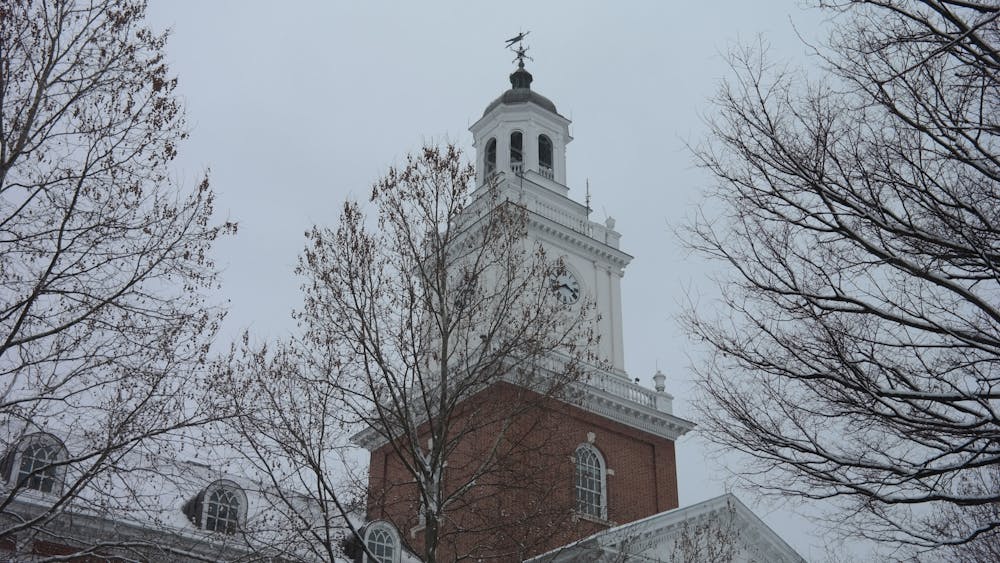The University announced that a new phase of the Bloomberg Distinguished Professorships (BDP) will double the number of professors in the program to 100, launch research clusters and fund new core facilities.
Michael Bloomberg’s landmark donation of $350 million created the BDP program in 2013. The program brought together 50 researchers with appointments in more than one department of the University to act as bridges linking different disciplines.
According to an email sent to University constituents by University President Ronald J. Daniels, a second gift has allowed the University to recruit 50 additional Bloomberg Distinguished Professors to work in interdisciplinary clusters focused on artificial intelligence (AI), the health effects of climate change, racial equity, neuroscience and pandemic preparedness and response.
In interviews with The News-Letter, Bloomberg Distinguished Professors shared their experiences in the program and discussed what makes the program special.
Anton Dahbura, executive director of the Information Security Institute, stated that it takes visionary leadership, support and philanthropy to put together a program like BDP.
According to Dahbura, the BDPs' interdisciplinary approach is essential to solving fundamental societal problems.
“The reality is that the most pressing societal problems don't fit neatly in one bucket. They're not just solely engineering or solely public health, and so forth," he said. “So the BDPs that have been appointed are really incredible people who can span those areas and have the best chances of addressing these critical societal issues.”
In an interview with The News-Letter, Richard Huganir, professor of neuroscience and psychological and brain sciences and director of the Solomon H. Snyder Department of Neuroscience, expressed his content with the BDP program’s initiative in recruiting top researchers of peer institutions.
According to Huganir, the Department of Neuroscience was able to recruit three new faculty members from Scripps Research, the University of California, San Francisco and Yale University.
Taekjip Ha, professor of biomedical engineering, biophysics and biophysical chemistry, reflected on how the BDP program impacts diversity and equity in academia.
“In terms of gender and racial diversity, it is much better than the academic profiles on average,” he said. “I give a lot of credit to the BDP program and the University for making efforts in that direction. It is very difficult to achieve that.”
In an interview with The News-Letter, Ashlee Feng, a PhD candidate co-advised by Ha and Carl Wu, another Bloomberg Distinguished Professor, agreed that the program fosters diversity and inclusion in research.
“As an international student from China, I really appreciate the opportunity to be here at Hopkins, and I can see that the research labs here have a very diverse group of people,” she said. “The exposure to different cultures and people's different way of thinking about research, has stimulated our discussion about science and also helps us get to know and appreciate research on different cultures.”
Huganir noted the challenges in recruiting diverse hires at a senior level.
“Diverse candidates [at other schools] are cherished by their university, so they’re usually very comfortable where they are, and it’s hard to get them to leave,” he said. “That’s where the challenge is — recruiting diverse candidates at that high, Bloomberg Distinguished Professor level.”
However, he is optimistic that the new initiative — which, beyond recruiting more senior faculty members, will focus on junior faculty hires — will attract strong candidates at junior levels that can increase gender and ethnic diversity within the Neuroscience Department.
Ha also noted that the BDP allows him more flexibility with his research. He had received funding to start new projects that would have been too risky to investigate with federal funding, such as gene editing.
In regard to the future of the expanded BDP program, Dahbura expressed his excitement to pursue inter-cluster collaborations.
“We look at the full range of applications of AI as well as the fundamentals of AI because we're looking at questions like fairness and bias, equity, transparency, explainability in AI. These are very difficult issues,” he said. “Everyone working on applications of AI in the real world encounters the majority of these issues. These questions present the opportunity for collaboration.”
Huganir shared his excitement about the BDP initiative and its implications for the future of neuroscience at Hopkins.
“It’s created a lot of momentum in a lot of departments and new nucleation points across different departments,” he said. “We are really looking forward to ‘BDP 2.0.’ Recruiting 50 senior professors is not something you do every day, and... neuroscience in general across the campus is getting one of the largest cluster group hires. We will be recruiting six Bloomberg Distinguished Professors.”
In an email to The News-Letter, Vice Provost for Research Denis Wirtz wrote that the additional recruitment of Bloomberg Distinguished Professors will benefit undergraduate students as well.
“One very big implication for JHU undergraduates is that we’re going to have more BDPs — who are world-class faculty — teaching undergraduate courses,” he wrote. “Many of the BDPs are eager to cultivate new researchers and scholars who can lead the next generation, and that starts with undergraduate education.”
He noted that the BDP summer program, which offers undergraduates the opportunity to work with a BDP full-time for 10 weeks, will continue, and the Office of the Vice Provost for Research will constantly review how resources are allocated to the program.
In his interview, Dahbura emphasized that undergraduates should take advantage of the opportunity to work together with accomplished scholars in their fields.
“I strongly encourage students to take courses with or do independent research with these BDPs because it's a once-in-a-lifetime opportunity,” he said.
Ishan Kalburge contributed reporting to this article.





